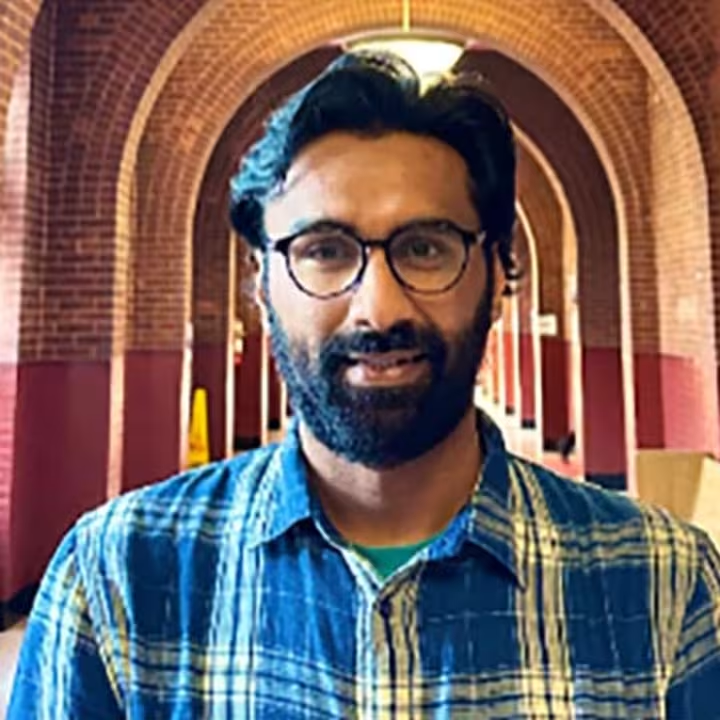Badar Khan Suri, a Georgetown University professor and postdoctoral scholar who was arrested and targeted for deportation by the Trump administration last month, was most concerned for his students after he was detained, according to members of the Georgetown community.
Suri, who was born in India and in the U.S. on a student visa, had been teaching a course on minority rights in South Asia at the university’s School of Foreign Service (SFS). A student and faculty members told NBC News that amid the shock of his arrest, Suri still kept his class at the forefront of his mind.
One of his students, Roudah, who requested to be identified by her first name out of fear of retaliation, said she spoke to his family not long after he was detained.

“As he was being arrested by these masked men in normal clothing who just pulled up in front of their apartment building, he told her, ‘Take care of my students. Make sure that they have someone to teach the class,’” Roudah said of his final conversation with his wife before he was taken away. “He wasn’t worried about what’s going to happen to him and his reputation. He was worried about his students.”Suri, whose attorneys filed a petition challenging his detainment, is currently being held in Texas at an ICE detention center. He was sent there after first being detained at a Virginia facility and then transferred to Louisiana due to a lack of space, according to court documents. The government this week filed a motion to dismiss or move his case to another jurisdiction. Attorneys for Suri have asked the court to return him to Virginia and release him pending the proceedings.
Suri, who has been a postdoc at Georgetown for the past three years, was accused by the Department of Homeland Security of “actively spreading Hamas propaganda and promoting antisemitism on social media.”
ICE did not immediately return NBC News’ request for comment. But assistant DHS Secretary Tricia McLaughlin addressed Suri’s detention on X, saying that “Suri has close connections to a known or suspected terrorist, who is a senior advisor to Hamas.”
Suri’s wife, an American citizen who is originally from Gaza, is also a student at the university. Her father, Ahmed Yousef, is a former adviser to now-deceased Hamas leader Ismail Haniyeh. In an interview with The New York Times, Yousef said he left his position more than a decade ago. He has also been outspoken in his criticism of Hamas.
More than a hundred students and faculty filled Georgetown University's Red Square, demanding the release of their teacher and colleague Badar Khan Suri. News4s's Drew Wilder explains the details.
Suri’s attorney Hassan Ahmad previously told NBC News that he has never made any pro-Hamas or antisemitic comments, calling his detention “contemptible.”
Joel Hellman, dean of the School of Foreign Service, said in a statement last month that the school did not observe any threatening behavior.
“During his time on campus, I am not aware that Dr. Suri has engaged in any illegal activity, nor has he posed a threat to the security of our campus,” Hellman said. “He has been focused on completing his research.”
Roudah said Suri’s arrest has prompted a great deal of anxiety for the students in his tight-knit seminar of five. While another professor has helped pick up the course, she said it’s difficult to replace Suri and the connection he had with his students. Roudah said she and her classmates often looked forward to his weekly lectures that he’d deliver over two and a half hours without reading from notes.
“He’s one of the most academically smartest people I’ve ever met in my whole entire life,” Roudah said. “This class doesn’t count for any of my graduation requirements, and I fully took it just because of Dr. Badar.”
Roudah added that Suri encouraged students to ask questions. And though the students would often skip the class readings, Roudah said Suri wouldn’t put too much pressure on them to speak up, as he “wouldn’t want to embarrass us.”
“He’s 1,000% very laid-back. He’s very chill,” Roudah said. “He’s slowly but surely made his way into everyone’s hearts.”
The first conversation that Suri had with his wife while in ICE detention also revolved around his students, worried about whether they’d be able to continue their studies, Dr. Fida Adely, a colleague of Suri’s, said.
“That was definitely one of his first concerns that he conveyed to her,” said Adely, who serves as the university’s director of the Center for Contemporary Arab Studies. “‘Do they know what’s going on?’”
Adely described Suri as a quiet person who was dedicated to becoming a successful scholar. At one point, Suri sought advice from her about getting his research published, she said. Outside the classroom, Adely said, he often attended Muslim events on campus with his wife and three children, mingling with community members.
“We often have visiting scholars who are here just because they want to be affiliated with Georgetown, but aren’t necessarily very active community members,” Adely said. “He was a very active member in many ways, participating in our seminars, coming to our social events.
Suri’s supervisor, Nader Hashemi, similarly said that his students were a priority for him.
“He focused all of his time on his research and his teaching,” said Hashemi, director of the school’s Alwaleed Center for Muslim-Christian Understanding.
The arrest came as a surprise, Hashemi said, as Suri was not particularly outspoken.
“He was not a public intellectual. He was just a humble young academic scholar,” said Hashemi, who was among the first people contacted by the family during the ordeal. “The shock and the trauma of this entire arrest … is just a reflection of the brutal authoritarianism of this Trump administration that is trying to inflict terror and trauma on society.”
As Suri and his family continue to push for his release, Roudah said she hopes people will understand one critical thing about her professor.
“I want people to humanize this case,” Roudah said. “These people have families. These people have lives. These people have people that care about them.”
Chloe Atkins contributed.
This article originally appeared on NBCNews.com. Read more from NBC News:






